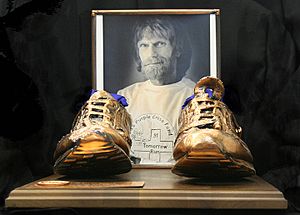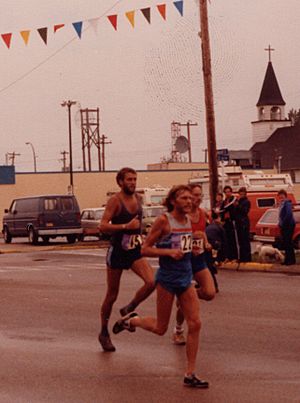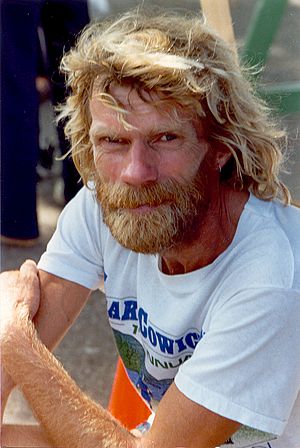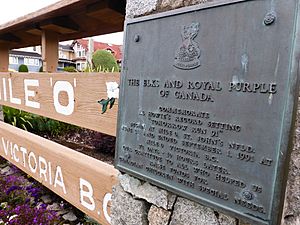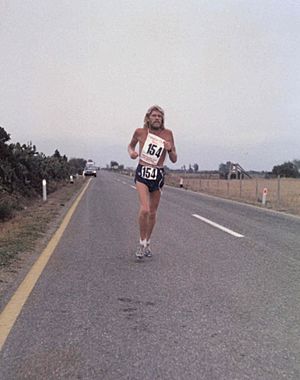Al Howie facts for kids
Arthur "Al" Howie (September 16, 1945 – June 21, 2016) was a Canadian long-distance runner. He won over fifty marathons, ultramarathons, and multiday races during his career. One of his most famous achievements was running across Canada in 1991. He covered 7295 kilometers in a record time of 72 days and 10 hours. A special plaque in Victoria, B.C., remembers this amazing run. He also raised $750,000 for children with special needs during this event.
Just two weeks after his Canada run, he won the Sri Chinmoy 1300 Miler race in New York. He even beat his own world record time! Both the Trans Canada run and the 1300-mile (2092 km) race were so impressive they made it into the Guinness Book of Records. Al Howie lived in Duncan, B.C., from 2005 until he passed away in 2016. He had been getting treatment for Diabetes I. The City of Duncan honored him with a special award in 2007. In 2014, he joined The Greater Victoria Sports Hall of Fame.
Contents
Biography
Al Howie's Early Life
Arthur "Al" Howie was born in 1945 in Saltcoats, Ayrshire, a town near Glasgow, Scotland. He went to school there and finished his secondary education. He later moved to Canada with his son, Gabe, and settled in Toronto. His daughter, Dana, was born in 1976.
Al started running in January 1974. He had just quit smoking and used running as a way to deal with the stress. He moved to Victoria, B.C., in 1978 and began training for very long runs. This included running between different cities.
The Prince George to Boston Marathon: 1979
The 1979 Prince George marathon is famous in sports history. It was the first marathon for three Canadian athletes who would become well-known: Al Howie, Rick Hansen, and Terry Fox. Al Howie had run all the way from Victoria to Prince George just to be in this race. The winner would get a trip to the Boston Marathon.
In the race, Rick Hansen easily won in his wheelchair. Al Howie finished third in his first 17-mile (27 km) run. Terry Fox, who had lost a leg, was the last to finish. He was only ten minutes behind the last two-legged runner, and the crowd cheered him on.
Al Howie was very inspired by Terry Fox's plan to run across Canada for cancer research. Al said that Fox created "a tremendous wave of energy and eagerness to excel."
From Marathons to Ultramarathons: 1980-1988
Al Howie started training very hard for longer and longer runs. In 1980, he won his age group in his first full marathon (42.195 km) in Edmonton. After that, he ran 806 miles (1,297 kilometers) from Edmonton to Victoria. He did this to enter the first Royal Victoria Marathon, where he finished fourteenth. Al would send his gear ahead on buses and then run to meet it.
In May 1981, Al set a Canadian and North American record. He did this at the annual Self-Transcendence 24 Hour Race in Ottawa. The next year, he ran even further, covering 150 miles and 395 yards in that race. This race lasted a full day and night with no sleeping. He won this 24-hour race in Ottawa five years in a row, from 1981 to 1985. In 1983, he even ran from Winnipeg to Ottawa before the 24-hour event.
In 1986, Al was recovering from cancer. He had his worst 24-hour race, covering only about 100 kilometers. But he was back in top shape for the 1987 Canadian 24-hour Championship in Ottawa. He won that event for the sixth time.
In the summer of 1985, a brain tumor appeared behind his ear. This made him stop running for a while. Al decided to try a special macrobiotic diet. He recovered enough by the next spring to run 1200 kilometers from Victoria to Fernie in southern B.C. This was where he had received some of his treatment.
In 1987, he broke a record for the longest continuous run. He completed 360 miles (580 kilometers) by running 1422 laps around the University of Victoria's Centennial Stadium. This took him 104.5 hours, which is over four non-stop days and nights. He did this to promote the upcoming Commonwealth Games. In 1988, he set a record for the 880-mile (1416 km) Land's End to John o' Groats run. He ran the entire length of Britain in 11 days. A few months later, he ran from England through France to the island of Sardinia in Italy. There, he took part in the Super-Marathon Nuraghe.
The Peak Years: 1989 to 1991
The 'Ultra Trio' of races began in 1987. These were three very long races: 700, 1000, and 1,300 miles. No one finished the 1300 Miler in New York in 1987 and 1988. But in 1989, Al Howie was the first person ever to complete the tough Sri Chinmoy 1300-mile (2092 km) distance. He set a world record at 17 days and 9 hours. He also set a world record for 2000 kilometers in the same race.
Later that year, Al set a record of 255.5 miles (411 km) for the 72-hour "Across the Years" race in Phoenix, Arizona. This race is special because it starts at the end of one year and finishes at the beginning of the next. Al ran from December 29, 1989, to New Year's Day, 1990.
Al Howie's longest and most famous run was in the summer of 1991. He ran the entire length of the Trans Canada Highway. He started at Mile Zero in St. John's, Newfoundland, and finished at Mile Zero in Victoria, B.C. He covered 7295.5 km in a record time of 72 days, 10 hours, and 23 minutes. A brass plaque in Victoria remembers this event. This run also qualified him for the Guinness Book of Records. He raised $750,000 for a fund that helps children with special needs.
Just two weeks after his Trans Canada run, Al was back in New York. He improved his own record time for the 1,300-mile (2092 km) race. He finished it in 16 days and 19 hours. This earned him his second entry that summer in the Guinness Book of Records. His Sri Chinmoy running friends even called him "the trans Canada crossing god."
Battling Injuries and Illness: 1985, 1992 – 1999
Brain Tumour
Al Howie's first attempt to run across Canada by himself was in the summer of 1985. The route was from West to East, heading towards Ottawa. This run was part of his North America tour to promote world peace and famine relief. The run stopped suddenly in the Ottawa Valley. A brain tumor appeared behind his right ear, making him think about dying.
"Facing death, I realized how much I loved this life; I didn't want to die," he wrote later. He didn't want to have the usual medical treatments like surgery and chemotherapy. Instead, he looked for other ways to heal. He found a special diet called macrobiotics, which focused on healthy foods without additives. He also tried shiatsu massage. Amazingly, his illness got better within months, and he started training again. To show his thanks, he ran 1200 kilometers from Victoria to a farm in Fernie, B.C., where he had received some healing advice.
Diabetes I
In 1992, the year after crossing Canada, Al joined 28 other ultra-runners in a race across the United States. He wasn't wearing the right shoe inserts while crossing the hot Mojave Desert in Arizona. He got bad blisters on his feet, which made him stop the race. He believed this injury eventually led to him getting Diabetes I. Sadly, it took three years for doctors to diagnose it.
He competed in the 1300 Miler in New York in 1993. But a problem with a nerve in his left knee forced him to stop after six days of running. By the summer of 1995, he had lost 30 pounds, and his health was very poor. He later wrote that Type 1 diabetes used to be "a death sentence within two years" before insulin was discovered.
Al wrote that he started insulin treatment, which helped him manage the disease. "Fighting back to life and health, this time via the more conventional method, the only way to go for insulin dependent diabetics—insulin therapy." He tried to make a running comeback in the 1996 Victoria 24-hour run. But he could only manage 100 kilometers in the day and night race. Al did a couple of runs for the Victoria chapter of the Canadian Cancer Society in 1996, running the length of Vancouver Island for them.
However, Al Howie refused to let his illness stop his tough training.
He wrote about his experience: "I'm back on the multi-day circuit, with my insulin pens and meter in my sport bag along with my running shoes, special shoe inserts, and petroleum jelly. Just like life, I find diabetes makes racing more complicated but also makes the adventure more exciting. My chance for success, even for breaking records in the tough sport of ultra-marathon racing, will not be stopped by my diabetes. Running towards the limits of human endurance with synthetic insulin is like exploring a new world. Instead of hitting a runner's 'wall,' low blood sugar becomes the main danger to avoid. Once again, I'm a pioneer in the world of running, this time in the 'diabetic galaxy.'" (Al Howie on the Come Back Trail, December 1997.)
He was back on track in 1997, winning the Victoria 24-hour race. By 1998, he felt he had regained his ultra-running form. He won four out of four ultra-races he entered, at distances from 50 miles (80 km) to 72 hours.
His last race was the 72-hour "Across the Years" event in Phoenix, Arizona. It started on December 29, 1998, and finished three days later on New Year's Day, 1999. Al Howie won the race.
Dealing with diabetes for 15 years was a huge challenge. Al Howie was 46 when he ran across Canada. He lived in a care facility in Duncan, British Columbia, where he received treatment for diabetes. He passed away in June 2016.
Honours
A brass plaque on the post of the Trans Canada Highway Mile 0 marker in Victoria's Beacon Hill Park reads:
The Elks and Royal Purple of Canada
Commemorate Al Howie's record setting
"Tomorrow Run 91"
Began at Mile 0 St. John's, Nfld
June 21 and ended September 1, 1991, at
Mile 0 Victoria BC
72 days – 10 hours later.
Our gratitude to all who helped us raise funds
for Canadian children with special needs.
- Qualified for the Guinness Book of Records for the Trans Canada run and the Sri Chinmoy 1300 miler race in 1991.
- "The Al Howie Room" is a special room at the CycleInn B & B in Langford. It has pictures and prizes that belonged to Al Howie.
- The story of Al Howie was the main topic of a sermon by Dr. Eugen Bannerman at Gordon United Church, Langford, on February 19, 2006.
- The City of Duncan gave Al Howie the Perpetual Trophy for Excellence and Sportsmanship in December 2007.
Running History
- Year started running: 1974.
- First "between cities" run: from Victoria to Port Hardy on Vancouver Island, 1978.
- First marathon: "Prince George to Boston," 1979.
- Best marathon time: 2:29:11 in Vancouver, May 2, 1982.
- Marathons completed: Scores (many).
- First Ultramarathon: Sri Chinmoy International 24-Hour race in Ottawa, 1981. He set a North American record of 150 miles, 395 yards in 1982.
- Ultramarathons completed: Scores (many).
- Average yearly mileage: 10,000 kilometers.
- Longest documented solo run: Trans Canada Highway, summer 1991. He ran 7295.5 kilometers in 72 days, 10 hours, and 23 minutes.
- Most memorable ultras: Sri Chinmoy 24-Hour race, Ottawa, 1981; Sri Chinmoy 1300 Miler, New York, 1991.
- Worst ultra: Sri Chinmoy 24-Hour race, Ottawa, 1986. He was recovering from cancer at the time.
- Average weekly training mileage: 200 kilometers.
- Peak week: 595 Miles (during the first week of a multi-day race).
- Favorite shoes: Brooks Kona.
- Most common injury: Blisters on feet; Diabetes I since 1995.
- Average training pace: 14 kilometers per hour.
- Favorite race drink/food: Water/Power Bars.
- Running idols: "I don't idolize anyone but I admire many."
- Greatest influence: Don Ritchie, Emil Zatopek, Yiannis Kouros, Hilary Walker.
- Favorite place to run: Sri Chinmoy one-mile loop, Flushing Meadow, New York.
- Funniest running experience: Learning to tie his shoelaces without stopping during a world record non-stop run.
- Most memorable discovery: "Even very good runners can have serious health problems."
- Last completed race: "Across the Years" in Phoenix, Arizona, between December 29, 1998, and January 1, 1999.
Personal Bests
- Mile: 4:44 (1982)
- 10 Miles: 51:52 (1981)
- ½ Marathon: 1:12:28 (1982)
- Marathon: 2:29:11 (1982)
- 50K: 3:13:49 (1983)
- 50 Miles: 5:35:12 (1983)
- 100K: 7:30:31 (1983)
- 100 Miles: 14:06:18 (1982)
- 200K: 18:51:44 (1982)
- 24 Hours: 150 miles 395 yards (1982)
- 48 Hours: 203 miles (327 km) (1992)
- 72 Hours: 272 miles (1991)
- 6 Days: 514 miles (827 km) (1991)
- 1000K: 7 days, 18 hours, 49 min, 18 sec (1991)
- 1000 Miles: 12 days, 1 hours, 47 min (1991)
- 2000K: 15 days, 23 hours (world record, 1991)
- 1300 Miles: 16 days, 19 hours (Guinness record, 1991)
- Trans Canada Highway: 7295.5 kilometers in 72 days, 10 hours and 23 minutes (Guinness record, 1991)
Multi-Day, Multi-City Runs
Early in his running career, Al Howie started running from city to city. He did this partly for long-distance training and partly to save money. He would send his clothes on the bus, run to the city, change, and then send his bags back on the bus. He often ran for charities and other good causes. Here is a list of Al Howie's multi-day, multi-city runs, with estimated distances and the charities he supported:
- October 1978: Ran the length of Vancouver Island from Victoria to Port Hardy (500 km) to support United Way.
- April 1979: Ran from Port Hardy to Victoria (500 km), carrying a letter from the mayor of Port Hardy to support UNICEF.
- August 1979: Training run from Victoria to Prince George (820 km). He placed third in the "Prince George to Boston" marathon.
- September 1980: Jogged from Edmonton to Victoria (1350 km in 11 days). He placed in the top ten in the first Royal Victoria Marathon.
- August 1981: Ran from Kelowna to Courtney on Vancouver Island (750 km) to promote the B.C. games. He arrived to big cheers during the opening ceremonies.
- July 1982: Ran from Calgary to Slave Lake, Alberta (470 km). He won the Slave Lake Riverboat Daze Marathon, then ran back to Calgary (470 km).
- August/September/October 1982: Placed third in the Prince George Classic. Then ran from Prince George to Victoria (820 km). He won his age group in the Royal Victoria marathon.
- May 1983: Solo run from Winnipeg to Ottawa (2225 km). He won the 24-hour race.
- May 1984: Ran from Toronto to Ottawa (450 km) for the 24-hour Race.
- December 1984: Ran from Victoria to Port Hardy (500 km) for the Times Colonist 1000 Fund.
- February 1985: Ran the Trans Canada Highway, Yellowhead route via Prince Rupert and Edmonton to Ottawa (4740 km). This race was stopped because a brain tumor appeared.
- April 1986: Ran from Victoria to White Spruce Farm in Fernie (1000 km).
- September 1987: Ran from Victoria to Port Hardy to Massett in the Queen Charlottes (870 km), with a letter from the Victoria Mayor to support United Way.
- June/July 1988: Ran the length of Britain (1400 km in 11 days).
- September 1988: Ran from England through France to Sardinia in Italy (1500 km) to enter an ultramarathon.
- 1989 & 1990: No runs between cities.
- June to September 1991: Ran the Trans Canada Highway from Mile Zero in St. John's, NL, to Victoria, BC (7295.5 km in 72 days and 10 hours). He raised $750,000 for the Elks and Royal Purple of Canada for their Purple Cross Fund for children with special needs.
- June 1992: Trans-American Footrace from Huntington Beach, CA, to New York, NY. Severe blisters forced Al to drop out in Las Vegas (370 km).
- December 1992: Ran from Victoria to Sacramento (1190 km) for the Helen Klein 6-day race.
- 1993 & 1994 & 1995: No runs between cities.
- October 1996: Ran length of Vancouver Island to Port Hardy (500 km) for the Canadian Diabetic Association. He stopped running due to insulin treatments for Type I diabetes.
 | Jewel Prestage |
 | Ella Baker |
 | Fannie Lou Hamer |


